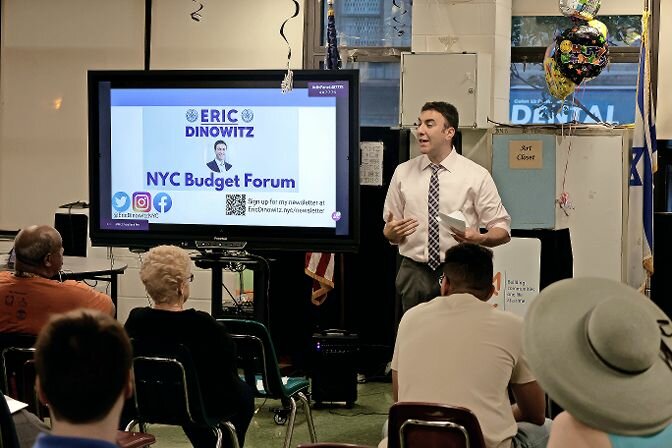Councilman Dinowitz gives peek behind New York City budget negotiations
It was back-and-forth between mayor, council leading to the final plan
Councilman Eric Dinowitz discussed education, housing, mental health, and literacy funding with residents at a budget forum last Thursday at Mosholu Montefiore Community Center.
The councilman said the official work for the budget process is done generally from January to June, whereas the fiscal year is from July 1 to June 30. He said in New York City it’s important to have a balanced budget since they can’t borrow money or print money like the federal government.
He described what it was like for the council members working with Mayor Eric Adams.
“This whole process is a sort of back and forth between the mayor,” Dinowitz said. “He presents something to us. We have hearings. We present something to him, he presents something to us. We have hearings and then we agree on the budget, vote on the budget, and then we make modifications as the year goes on.”
The mayor’s preliminary budget had proposed cuts of 3 percent across the board to the education department and CUNY, and 4 percent to all other agencies. He said that agencies like department for the aging, older adult centers, and department buildings needed more staff and inspectors. A lot of the savings that were realized in the city budget were done through vacancy reductions.
“A lot of our fights and a lot of our wins dealt with restorations of cuts,” Dinowitz said. “Without the council’s advocacy we would have seen significant cuts to every agency and to a lot of the services we’ve come to rely on.”
One of the debates the council had with the mayor was on investing in workforce and safeguarding delivery of services. According to Dinowitz, the mayor said they could be more efficient by reducing staff.
The council members though said they were being inefficient by not being able to provide robust services for their neighbors.
Another issue is the council members not always knowing how much money they’ll have in the budget, with members having to release information before the state budget comes out. And with the state budget being late this year, it made their jobs much harder.
During hearings members can bring up their budget concerns. The public can testify in person or virtually as well. Dinowitz said he took input from the local community boards, students from the Urban Debate League and a District 11 survey to see how the public wanted his office to advocate for them with both the city budget and discretionary funds. Some of the most important priorities for community members according to the survey were youth, education, environment, housing, mental health, cultural arts, and literacy.
One issue members pressed the administration on during the hearings was school budgets, which last year had a big fight with schools being told they would start the year with little money, despite having a higher enrollment. To combat that this year, the council got the DOE to commit to freezing the initial school budgets and thereby give the schools more wiggle room.
As a former teacher himself, Dinowitz found it important to protect education. Some of the discussions he had were regarding lifeguards and pool safety. Dinowitz was able to secure money for the Clinton School pool, which for a long time has been unusable and unclean. The school construction authority renovated the pool, creating the opportunity for lifeguard training, swim classes and swim teams.
The budget ultimately had a vote of 39-12 to adopt the budget. Citywide they restored $36.2 million for libraries, $22 million for twice-day litter basket pickups, $40 million for public institutions like New York Botanical Garden and Wave Hill, and $2 million for tree stump removals.
Dinowitz spoke about Adams’ proposed budget cuts for senior centers. They were not able to restore all the cuts, but they were able to make some restorations in funding for the delivery meals for older adult centers. There was $5.6 million secured for groceries to provide monthly credits for groceries to eligible New York residents.
When it came to discretionary funding, Dinowitz used $10,000 on the Kingsbridge Historical Society for cultural programming, $18,200 for new trees and tree guards, $20,000 to Mindbuilders Creative Arts for youth empowerment programming, $10,000 to the Bronx Arts Ensemble for music concerts, and $10,000 to LINC for early literacy programming.
When a constituent at the budget forum said the 311 phone system needed to be upgraded, Dinowitz mentioned the difficulty of getting policies on the budget.
“There are some policies we can get on the budget,” Dinowitz said. “And some that are a little tougher. We can’t really micromanage the way the agency does the work to the budget. But I do have a number of bills that I proposed that are slowly working their way through the process.”
The Riverdale Press also asked Dinowitz on the 1099, a bill introduced to help retirees who the city is making leave their health insurance plan for another one. Dinowitz said it’s technically a budget item but not really because the city council doesn’t negotiate contracts. He said it isn’t just about finding the money, but making sure the mayor who controls the contracts and the unions have that agreement.
“I will be announcing a decision very soon,” Dinowitz said of the 1099. Though there are a number of issues at play. regarding a decision.






